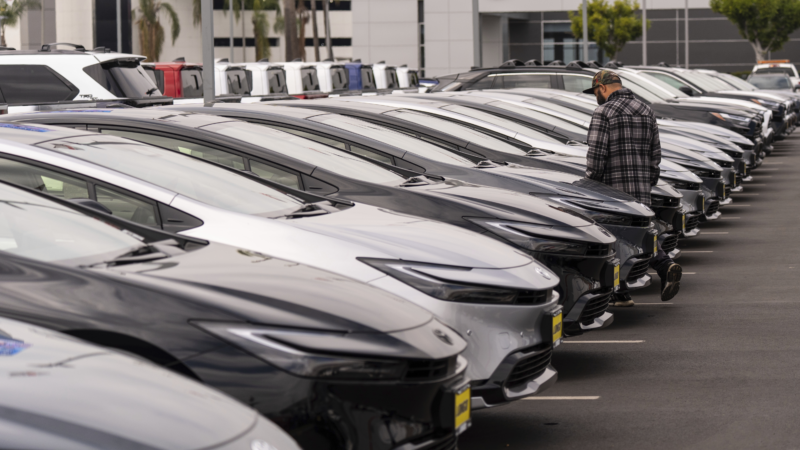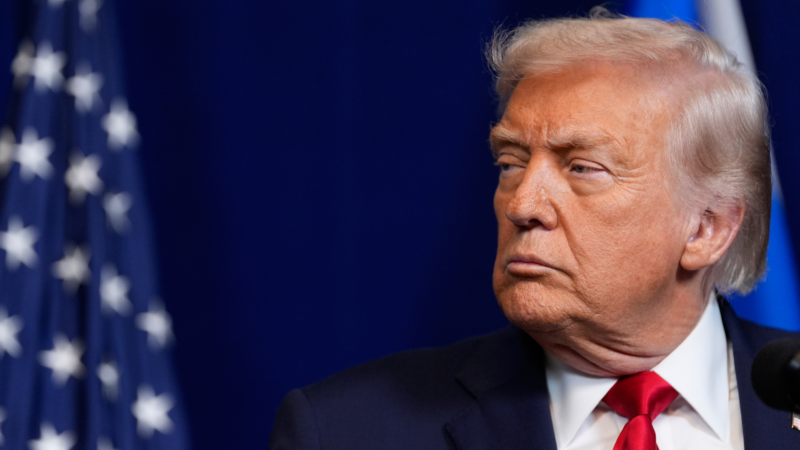How automakers are responding to the 25% car tariffs so far
President Trump’s 25% tariffs on imported cars took effect on Thursday. The import tax has already triggered big moves by automakers, from layoffs to pauses in car shipments to delayed price hikes.
As a result, industry analysts expect consumers to see higher car prices, and some buyers have been rushing to the dealerships in anticipation of future sticker shock.
Starting May 3, the tariff will also apply to imported car parts, such as engines and transmissions, which could add to the cost of cars assembled in the U.S.
The Trump administration has put forth a range of reasons for these tariffs, but said its primary goal is to grow U.S. manufacturing.
White House officials have said that foreign companies will absorb the costs of tariffs. But a study by the National Bureau of Economic Research, a nonpartisan nonprofit organization, found that’s not what happened during Trump’s first term — when costs were mostly passed on to U.S. businesses and consumers.
At least initially, automakers are approaching the tariffs differently. The common theme here? Uncertainty about the road ahead.
Job cuts at Midwest factories
Stellantis, which makes Jeep, Dodge, RAM trucks and Chrysler, announced a temporary halt in production at some of its assembly plants in Mexico and Canada. As a result, the company said that 900 people would be temporarily laid off at several Stellantis factories in Michigan and Indiana.
Stellantis’ North American Chief Operating Officer Antonio Filosa said in an email sent to employees on Thursday that while the company continues to assess the medium- and long-term effects of the tariffs on its operations, the immediate layoffs and production pauses “are necessary given the current market dynamics.”
Luxury car maker puts brakes on U.S. shipments
Jaguar Land Rover said it would pause shipments of its British-made cars to the U.S. this month while it weighs longer term plans.
“The USA is an important market for JLR’s luxury brands,” the company said in a an emailed statement on Saturday. “As we work to address the new trading terms with our business partners, we are enacting our planned short-term actions including a shipment pause in April, as we develop our mid- to longer-term plans.”
The company has provided electric Jaguar SUVs for Waymo, the driverless ride-hailing service owned by Google’s parent company. It’s not yet clear whether the tariffs will affect Waymo’s service.
Buyers scurry to beat the tariffs
As car companies weigh whether to charge more, buyers appear to be taking advantage of pre-tariff pricing. South Korean company Hyundai reported record sales of its cars last month — its second highest sales month in company history. The car maker has been ramping up production in the U.S. — not in response to the new tariffs, just happy timing, executives say — which should protect them from some of the import taxes. A Toyota spokesperson said the Japanese automaker also saw sales bump at the end of March from increased customer traffic at dealers.
Although dealers typically get a spring season boost, helped by consumer tax refunds, there’s some data to back up a tariff-fueled rush: A survey conducted at the end of March by market research firm AutoPacific found that 18 percent of new vehicle shoppers in the U.S. planned to make their planned car purchase sooner to dodge potentially higher prices resulting from tariffs.
Price hikes and price freezes
Before the tariffs went into effect, Italian luxury sports car manufacturer Ferrari said that most of its cars would increase in price by as much as 10% due to the new policies. Some current models, including the Roma which has a sticker price of almost a quarter million dollars, would be exempt from the increase. Ferrari said in a statement it will cover the tariff costs for the Roma, the 296 and SF90.
According to a Wall Street Journal report, BMW said that it will cover the inflated costs from the Trump administration’s tariffs on its cars made in Mexico, until at least May.
Other companies are giving customers a window of reprieve to buy without fear of higher prices.
Hyundai moved to reassure customers that it would not raise prices for its current model lineup for the next two months — until early June. Toyota, which has several production plants in the U.S., also has no immediate plans to increase prices, company spokesperson Victor Vanov said in an emailed statement. The U.S. was Toyota’s biggest market last year, with more than 2 million vehicles sold.
They may be staving off the inevitable: Market research firm Cox Automotive predicts that cars affected by the tariffs could see prices increase 10-15%. Prices of cars not hit by the full 25% tariff could jump 5%.
Some carmakers are slashing prices in response. Ford, which makes more of its cars in the U.S. than any other automaker, is offering employee pricing for customers as part of its “From America, For America” promotional campaign. Rival Stellantis has reportedly followed suit. Nissan cut prices on some of its best-selling models such as the Rogue and the Pathfinder, Car and Driver reported, to help buyers face a “challenging car-buying landscape.”
Meanwhile, the industry waits for the other shoe to drop, when the car parts tariffs start. Auto analyst Mel Yu told Reuters that imported car parts account for between 40-80% of U.S.-made cars and 20-40% of the retail price.
“No matter where they are made, car prices will go up,” Yu said. “The impact of the parts tariffs will be pretty quick.”
Warren Buffett officially retires as Berkshire Hathway’s CEO
The legendary 95-year-old investor spent decades building his company into one of the world's largest and most powerful. Now Greg Abel is taking it over.
Crypto soared in 2025 — and then crashed. Now what?
For most of 2025, cryptocurrencies such as bitcoin surged as President Trump vowed to make the U.S. a crypto leader. But now, a severe sell-off has shaken the sector.
Zohran Mamdani sworn in as New York City mayor, capping historic rise
Mayor Zohran Mamdani took the oath of office in New York City after midnight Thursday. The city's first Muslim mayor, a member of the Democratic Socialists of America, has promised to focus on affordability and fairness.
Rising from the ashes, a symbol of hope at the Rose Parade
Survivors of the Eaton and Palisades Fires find healing and community working on a Rose Parade float to honor the lives and communities lost in last year's wildfires.
The history behind the NYC subway station chosen for Mamdani’s swearing-in
The city shut down the station in 1945 on New Year's Eve. Eighty years later, it's a symbolic venue choice for the incoming mayor's private swearing-in ceremony.
U.S. military strikes 5 more alleged drug boats, killing 8
The U.S. military says it struck five alleged drug-smuggling boats over two days. The attacks killed eight people, while others jumped overboard and may have survived. U.S. Southern Command did not reveal where the attacks occurred.







